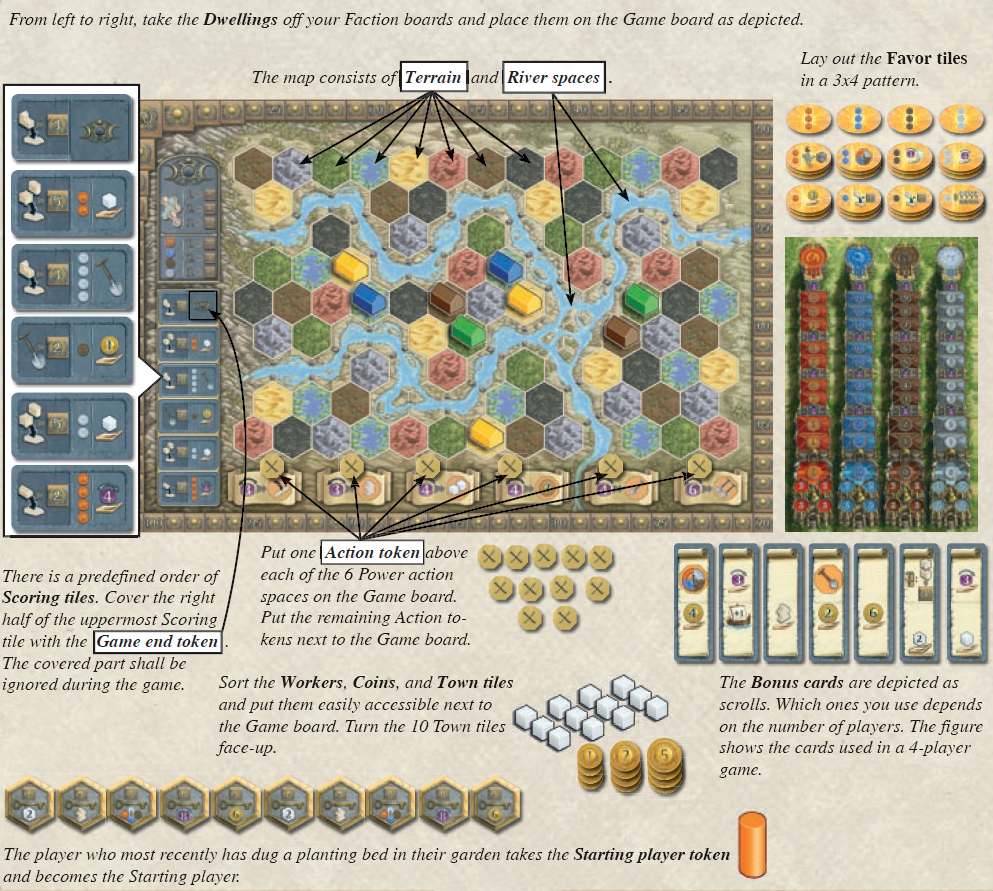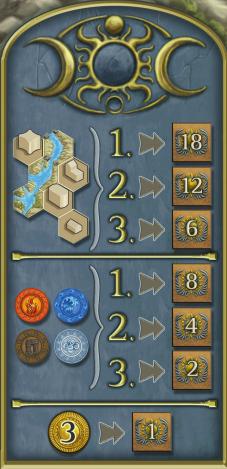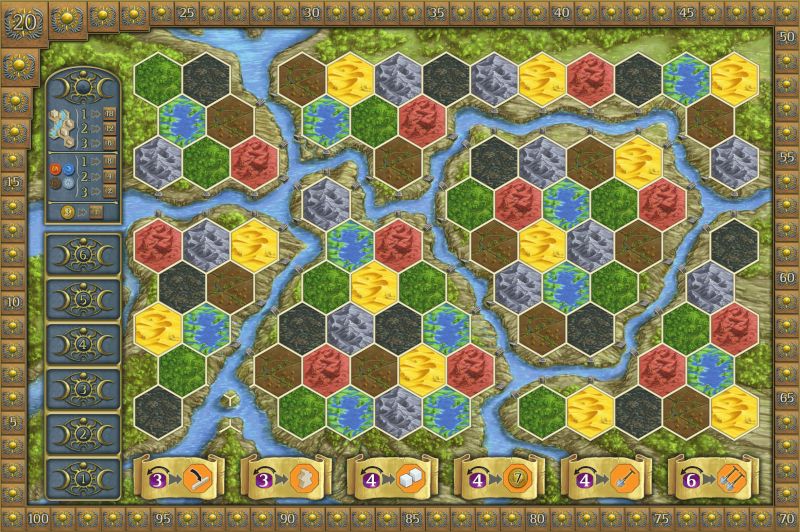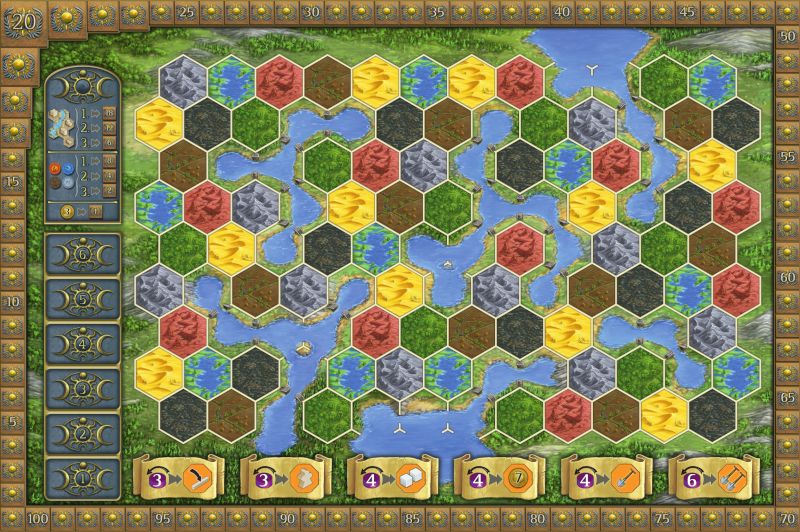If you are reading these rules for the first time, ignore the text along the right hand side. These rules serve as a summary to help you quickly familiarize yourself with the game.
Show
→ summary only
→ detailed version only
→ both summary and detailed version

Terra Mystica
The conference of the Council of Elders had been interrupted by a deafening turmoil.
“The Witches! The Witches!” a young voice was shouting, and fists were knocking on the door of the assembly
hall at which the ancestors of the Chaos Magicians had met. Finally, the door had been opened, and a young
female magician came rushing into the hall. “I’ve seen them!” she was shouting while gasping for breath. The
stern looks of the elders made her pause.
“How dare you break in on our conference?” the venerable spokeswoman of the Council of Elders sharply rebuked
the disturber. “And if this is really important, then talk to us reasonably. What did you see?”
Shara Nindée, the young Chaos Magician, took a deep breath and made herself report everything that she saw,
one thing at a time. “I’ve been to the south, on the edge of the forest. There’s Witches everywhere. They’re riding
their stupid broom sticks above our heads, then landing in the southern forest. And their numbers are still growing!
They’re about to settle here!”
This was an unpleasant message indeed. The Council of Elders had just decided to cut down the southern forest
to redirect some lava streams there and transform that forestland into treeless wasteland – just how they liked it.
The teams for this task had already been formed. And now it seemed the Witches had preempted that. Witches were a
forest-dwelling people and as such, they had spread to a number of forests.
Even worse – they used to plant trees where there had been none to convert all land gradually
to forest. What a nightmare for the Chaos Magicians who try hard to transform all land into wasteland.
Then Malkuzar, an old and wise Chaos Magician, spoke
up. The reason they called him wise was that he had survived
five or more of his self-experiments. “There is nothing
that can be done. It’s not necessarily bad for us to
have neighbors, it’s good for trading. When building our
own settlements, we can save a lot of gold by trading.”
Some of the elders nodded, others looked doubtful. “But
our people are ready to go and commence the groundwork,”
argued the spokeswoman. “Shall we just give up?
We need more wasteland!”
“Send Shara to the west, to the mountains,” Malkuzar
suggested. “Usually, there are some underground lava
streams in the mountains that we can open up. Mountains
are much easier to convert to wasteland than forests, anyway.
This is how we may preempt the Witches!”
The decision was taken. “As to you, Shara…” The young
magician had to gulp when she met the serious look of
the old Malkuzar. “As you’re so keen, I’ve got a mission
for you. Immediately travel to the west, to the mountains.
Check if things are still calm over there. Dwarves are usually
hanging around in mountains. That’s just what we
needed.”
Clarifications with regards to the original rules
The implementration refers to the
FAQ available on BGG.
Components
1
1
7
Faction boards (each side displays a different faction)
56
Terrain tiles (double-sided)
65
natural-colored Workers
40
small Coins (value 1)
25
medium Coins (value 2)
20
big Coins (value 5)
65
purple Power tokens (occasionally simply called Power)
1
orange Starting player token
17
Action tokens (used for Power and Special Actions)
1
Game end token
10
8
9
28
5
„100 Victory points“ tokens
5
“Actions” Overview tiles
4
zip-lock bags
per faction color (green, yellow, blue, brown, red, black, grey):
8
Dwellings
4
Trading houses
1
Stronghold
3
Temples
1
Sanctuary
7
Priests
7
Markers
3
Bridges
Setup
This section consists of two parts. For your first play, please follow the instructions of the static introductory game.
Add the changes for the variable main game in your second play at the earliest.
Put the Game board in the middle of the table and the Cult board next to it.
First Play
Assignment of factions
For your first game, we recommend you play Terra Mystica with
predefined factions. Depending on the number of players, take the
recommended factions and distribute them among the players:
- 2 players: Witches (green), and Nomads (yellow)
- 3 players: Witches (green), Nomads (yellow), and Alchemists (black)
- 4 players: Witches (green), Nomads (yellow), Halflings (brown), and Mermaids (blue)
- 5 players: Witches (green), Nomads (yellow), Halflings (brown), Mermaids (blue), and Giants (red)
Components in faction colors
Each Faction board has a Transformation cycle. It shows the seven types of terrain with the Home terrain of a given faction highlighted
by its larger size. The color of your Home terrain matches your faction’s color.
Take all the tokens in your faction’s color: Priests, Structures, Markers, and the Bridges.
Priests, Structures, and Bridges are limited by the token quantity.
Put the 7 Priests and the 3 Bridges next to your Faction board.
Put the Structures on the corresponding spaces on your Faction board.
Distribute the 7 Markers of your color.
-
Place one Marker on the leftmost space of the Shipping track (value 0).
(Only the Mermaids start with value 1. The Fakirs and Dwarves
do not have Shipping and therefore do not need this Marker.)
-
Place one Marker on the bottommost space of the Exchange track of
your Faction board – this is the space where 3 Workers equal 1 Spade.
(The Darklings do not need this Marker.)
-
Place another Marker on space 20 of the Victory point track on the Game board.
-
Distribute the remaining 4 Markers on space 0 of each of the 4 Cult tracks on the Cult board.
Faction setup
The setup for each faction is depicted on its Faction board.
Look at the top right corner of your Faction board, under your faction’s name, which and how many starting resources you get,
and place them on your Faction board.
On top of these starting resources, you will get your income for the first round.
Your Faction board depicts some Cult symbols next to the starting
resources. For each such symbol, move the corresponding Marker
on the Cult board up one space.
Your Faction board displays three Bowls of Power at its top left corner.
Distribute a total of 12 Power tokens (occasionally simply called
Power) between Bowls I and II as indicated on your Faction board.
Game and Cult board
For your first game, we recommend you play with the following setup. What follows is the setup for a 4-player game explained in detail.
The setup for a different number of players can be looked up in the rules pdf.

Changes in the main game
Unlike the introductory game, randomly select which Bonus cards and Scoring tiles to use.
Then, after these basic parameters are set, freely choose your factions. Also, freely place your first Dwellings.
The positions of the first Dwellings are not preset.
Scoring tiles
Randomly draw 6 Scoring tiles and put them face-up on the
Game board in random order. Each tile corresponds to a
round.
If for field 5 or 6 the tile with a Spade on the left side is drawn, first put it
aside and draw another tile instead. Afterwards shuffle it back in.
Cover the right half of the uppermost Scoring tile with the Game end token.
Bonus cards
Shuffle the 9 Bonus cards. The number of cards needed in the game depends on the number of players:
| No. of players |
2 |
3 |
4 |
5 |
| No. of Bonus cards needed |
5 |
6 |
7 |
8 |
Randomly draw the required number of Bonus cards and place them face-up next to one another.
Choosing a Faction board
The Starting player chooses a faction and takes its Faction board.
In clockwise order, each other player takes one of the remaining Faction boards and chooses which side to use.
Note: Alternatively, randomly assign the factions. (Take one Dwelling of each color and randomly distribute them among the
players.) Then choose one of the two factions: the front or back of the corresponding Faction board.
Once each player has decided on a faction, proceed with the faction setup as explained for the introductory game. Also, distribute
the components of your color as explained there. However, do not place your Dwellings on the Game board, yet.
Introduction
In Terra Mystica each player governs one of 14 factions trying to develop more successfully than their opponents. Terra Mystica
is a magical world: its inhabitants are able to transform the terrain they are living in. Each faction is bound to a specific type of terrain:
It can only build structures on its “Home terrain”. This is why each faction over the centuries needed to develop Terraforming capability.
A faction either lives in the Plains, the Swamp, the Lakes, the Forest, the Mountains, the Wasteland, or the Desert –
and each of them strives to transform the terrain according to its needs.







In the game, the players need to expand to build Dwellings. However, as they gain Power when another player builds Dwellings or upgrades
Structures directly adjacent to them, each player has to face the challenge of finding the right balance between
adjacency to other
players
and free space for expansion.
Existing Dwellings can be upgraded in multiple steps: to a Trading house at first, then to a Stronghold or Temple. One Temple can be
upgraded to a Sanctuary. Dwellings provide Workers. Upgrading a Structure increases your income in Coins, Power, or Priests.
A Dwelling may become a Sanctuary in three steps. Alternatively, one Trading house may become a Stronghold.
![[Bild Ausbau Gebäude]](/Games/TerraMystica/images/rules/upgrade_building.png)
Besides geographic expansion and upgrading Structures, players can also develop four Cults: Earth, Water, Fire, and Air. Progress in these
will be displayed on the Cult board. Developing them also provides an increase in Power and other rewards.
![[Bild Cult board]](/Games/TerraMystica/images/rules/cult_board_en.png)
In the end, the player who developed their faction the best wins the game.
Flow of play
Placing the first Structures
Beginning with the Starting player and in clockwise order, place one of your Dwellings on an existing Home terrain. Then, beginning
with the last player and in counterclockwise order, place a second Dwelling in the same fashion.
Not applicable in the beginner's setup.
Choosing the first Bonus card
Beginning with the last player and in counterclockwise order,
each choose and take one Bonus card.
Place 1 Coin from the general supply on each of the leftover Bonus cards.
Flow of play over 6 rounds
Further flow of play goes over 6 rounds. Each of the six rounds goes through three phases:
- PHASE I: Income Phase
- PHASE II: Action Phase
- PHASE III: Cult bonuses and Clean-up Phase
Placing the first Structures
Skip this section when reading for the first time. In the introductory
game, the first Structures are placed on predefined spaces.
Beginning with the Starting player and in clockwise order, place one of your Dwellings on an existing Home terrain. Then, beginning
with the last player and in counterclockwise order, place a second Dwelling in the same fashion.
(The Nomads place their third Dwelling after all players have placed their second one.
The Chaos Magicians place their only Dwelling after all other players have placed all of their Dwellings – if necessary,
after the Nomads have placed their third Dwelling.)
Details
-
Dwellings may only be placed on a faction’s Home terrain.
(Other than that, there are no restrictions.)
-
When placing the first Structures, players may not transform any Terrain spaces.
This will only be possible later in the game.
-
All Structures, incl. the Dwellings, are taken from left to right off your Faction board.
After placing the first Structures, there will be empty spaces on the
Dwelling track. These spaces define your income.
Choosing the first Bonus card
Beginning with the last player and in counterclockwise order,
each choose and take one Bonus card.
Bonus cards provide additional income, unlock Special actions or award
Victory points for certain Structures at the end of a round.
Place 1 Coin from the general supply on each of the leftover Bonus
cards.
(The purpose of these Coins is to make the less frequently
taken Bonus cards more attractive in later rounds.)
At the end of each round, there will be 3 leftover Bonus cards that each get 1 Coin.
Flow of play over 6 rounds
Further flow of play goes over 6 rounds. Each of the six rounds goes through three phases:
- PHASE I: Income Phase
- PHASE II: Action Phase
- PHASE III: Cult bonuses and Clean-up Phase
Collect new Workers, Coins, Priests, and Power:
Basic income for Structures
Workers: equal to the number of visible Worker symbols on your Dwelling track
Coins: equal to the number of visible Coin symbols on your Trading house track.
Priests: equal to the number of visible Priest symbols on your Temple track.
Another Priest symbol will be visible once you have built your Sanctuary.
Power: according to the visible Power symbols on the Trading house track.
The Stronghold usually provides additional Power.
Additional income for cards and tiles
Income depicted on your Bonus card
Income depicted on your Favor tiles.
Collect new Workers, Coins, Priests, and Power.
You also go through this phase on the 1st round. Consequently, you
first collect your faction-specific starting income and then also the
income for the 1st round.
 Your income depends on the Structures you have built, on the Bonus card you have chosen,
and (later in the game) on the Favor tiles you own. On all components, income is symbolized by an open hand.
Your income depends on the Structures you have built, on the Bonus card you have chosen,
and (later in the game) on the Favor tiles you own. On all components, income is symbolized by an open hand.
Basic income for Structures
Workers: Take a number of Workers from the general supply equal
to the number of visible Worker symbols on your Dwelling track.
Coins: Take a number of Coins from the general supply equal to
the number of visible Coin symbols on your Trading house track.
Priests: Take a number of Priests from your supply equal to the
number of visible Priest symbols on your Temple track. Another
Priest symbol will be visible once you have built your Sanctuary.
(Both the Swarmlings’ Sanctuary and the Darklings’ Sanctuary
provide 2 Priests.)
Put the newly gained Workers, Coins, and Priests on your Faction
board.
(If the supply of Workers or Coins runs out, replace
the missing components with something else. Only your supply of
Priests is limited.)
Power: Power is gained according to the visible Power symbols
on the Trading house track. The Stronghold usually provides additional
Power
(except for the Alchemists who collect 6 Coins instead,
or the Chaos Magicians who collect 2 Workers instead, or
the Fakirs who collect 1 Priest instead)
.
Additional income for cards and tiles
Beside the income collected via your Faction board, add the income
depicted on your Bonus card and
Favor tiles.
![[Picture Income]](/Games/TerraMystica/images/rules/example_income_en.png)
Beginning with the Starting player and in clockwise order, each player takes exactly one Action.
Continue to do so until no player wants to take any more Actions.
During the Action phase, beginning with the Starting player and in
clockwise order, each player takes exactly one Action. Continue to
do so until no player wants to take any more Actions.
There are eight possible Actions to choose from. Except for passing,
all Actions can be taken multiple times during the same Action
phase (but only once per turn).
This section explains the relations between the Actions.
Action #1 - Transform and Build - is to build Dwellings on unoccupied terrain. Actions #2 -
Advancing on the Shipping track - and #3 - Advancing on the Exchange track -
facilitate building. At the end of the game, there is a special
scoring for the largest connected area.
Action #4 - Upgrading a Structure - is to upgrade Structures. Many factions need to build
their Stronghold as soon as possible. On the other hand, Temples
and the Sanctuary are also very valuable as they provide Priests
and Favor tiles, needed to score well during the Cult scoring at the
end of the game.
Action #5 - Send a Priest to the Order of a Cult - directly affects the Cult scoring and provides additional
Power via Priests and Cults. Power can then be used for special
Power actions (#6 - Power actions -).
Action #7 - Special actions - explains the Special actions that you can unlock during
the game.
Finally, Action #8 - Passing and new Starting player - needs to be taken when you cannot or do not
want to take any more Actions in the current Action phase.
First, you may change the type of one Terrain space. Then, if you
have changed its type to your Home terrain, you may immediately
build a Dwelling on that space.
Building a Dwelling
In order to build a Dwelling on a Terrain space, this space needs to be…
- of your color (i.e. it needs to be your Home terrain)
- unoccupied
- directly or indirectly adjacent to one of your Structures
Each Dwelling costs 1 Worker and 2 Coins.
If the current Scoring tile depicts a Dwelling, you get 2 Victory points for each Dwelling you build.
Power via Structures
Building a Dwelling or Upgrading a Structure gives your opponents the possibility to gain Power.
Amount of Power gained is the sum of Power values of opponent's Structures directly adjacent to the new/upgraded Structure.
Price of Power: One less Victory Point than Power gained.
It's not allowed to gain less Power to keep the price low.
Transforming a Terrain space
Transforming an unoccupied Terrain space into your Home Terrain (Costs see the Exchange track on your Faction board).
Gain Spades:
- You may exchange Workers for Spades
- through Power actions
- Bonus card
- Cult bonus in Phase III (but no possibility to build a Dwelling then)
Scoring tile may give points when using a Spade.
First, you may change the type of one Terrain space. Then, if you
have changed its type to your Home terrain, you may immediately
build a Dwelling on that space.
Building a Dwelling
In order to build a Dwelling on a Terrain space, this space needs to be…
- of your color (i.e. it needs to be your Home terrain)
- unoccupied
-
directly or indirectly adjacent to one of your
Structures (“Adjacency” is defined here).
Also, you need to pay its building costs. Each Dwelling costs 1 Worker and 2 Coins.
(Exceptions: The Engineers build Dwellings for 1 Worker and 1 Coin,
the Swarmlings for 2 Workers and 3 Coins.)
When building, take Structures (incl. Dwellings) from left to right off your Faction board.
If the current Scoring tile depicts a Dwelling, you get 2 Victory points for each Dwelling you build.
Power via Structures
When building a Dwelling or upgrading a Structure, your opponents may gain Power.
Each Structure has a Power value. The Power value of each Structure
is depicted to the right of its track on the Faction board:
-
The Stronghold and Sanctuary have a Power value of 3.
-
Trading houses and Temples have a Power value of 2.
-
Dwellings have a Power value of 1.
When building a Dwelling (Action #1) or upgrading a Structure
(Action #4), you must inform the owners of Structures directly adjacent
to your Structure that they may gain Power (see “The Bowls of Power”).
In order to determine the total number of Power an opponent may gain, add up the Power values of their Structures directly
adjacent to your newly built Structure.
![[Picture Power by Upgrade]](/Games/TerraMystica/images/rules/example_power_by_upgrades.png)
Example:
The Mermaid player (blue) needs to inform the Nomad player (yellow) that he may gain exactly 3 Power
due to the newly built blue Dwelling: 1 Power for the yellow Dwelling plus 2 Power for the yellow
Temple. The Nomad player does not gain Power for the yellow Trading house as it is not directly adjacent
to the blue Dwelling.
Details
-
You do not gain Power for your own Structures. Power can only
be gained when an opponent builds Structures.
-
Beginning with the player to the left of the active player and in
clockwise order, each affected opponent needs to decide whether
to actually gain the Power or not.
(The next section explains why
you might want to refuse to gain Power.)
The price of Power
Unfortunately, Power gained via Structures is not free. To gain that
Power, you need to lose a number of Victory points equal to one
fewer than the number of Power gained.
Thus, gaining 1/2/3/4/… Power costs 0/1/2/3/… Victory points.
Details
-
You may not end up with a negative score when losing Victory points.
-
You may not gain less Power in order to save Victory points.
Either take it all or gain nothing. (Exceptions: If you have not
enough Power tokens in Bowls I and II, gain as many Power as
needed to move all of them to Bowl III and lose Victory points accordingly.
Also, you may gain less Power to avoid a negative
score. In this case, only gain as many Power as needed to end up
with 0 Victory points.)
-
You only lose Victory points when gaining Power via Structures.
You do not lose any Victory points when gaining Power otherwise.
Transforming a Terrain space
To ensure the first condition is met, you are allowed to transform one unoccupied Terrain space into your Home terrain
immediately before building a Dwelling. Place a
Terrain tile of your color on that space.
Transformation has its price: Each step between the
source and destination terrain on the Transformation
cycle of your Faction board costs 1 Spade. Thus, transforming
adjacent types of terrain (on the Transformation
cycle) into one another costs 1 Spade, with a maximum
cost of up to 3 Spades if they are on opposite sides of the
cycle as you can move in either direction on the cycle.
(Exception: Giants always have to pay exactly 2 Spades
to transform any type of terrain into their Home terrain.)
Spades can be acquired in a variety of ways.
You may exchange Workers for Spades. The Exchange track of
your Faction board displays the Exchange rate: At the beginning of
the game, this is usually 3 Workers for 1 Spade (see Action #3).
(The Darklings pay 1 Priest for each missing Spade instead.)
1 or 2 Spades can be acquired via certain Power actions (see
siehe Action #6 or Appendix I).
One of the Bonus cards provides 1 Spade
(see Action #7, or Appendix IV).
(Halflings and Giants gain additional Spades for immediate use after building their Stronghold.)
Spades may only be applied to a single Terrain space. However, there are two special cases:
-
If the Spades gained via a Power action or Bonus card do not suffice
to transform a Terrain space into your Home terrain, you may
exchange Workers for the missing Spades (
at the current Exchange
rate of your Exchange track
).
(The Darklings pay 1 Priest for each missing Spade instead.)
-
When gaining 2 Spades, if you only need one of them to transform
a Terrain space into your Home terrain, you may apply the
second Spade on another Terrain space. However, you may not
place a Dwelling on this second space.
(The same is true when the Halflings build their Stronghold,
immediately gaining 3 Spades, see last page.)
Details on using Spades
-
You may not save Spades for future Actions. Spades need to be used immediately.
-
If the left side of the current Scoring tile depicts a Spade, you get
Victory points for using Spades during the current Action phase.
-
After transforming a Terrain space, you do not need to build a
Dwelling immediately. You can do this in another Action at a later point in time.
-
You do not need to transform a Terrain space into your Home
terrain, you may stop at any other type of terrain
(e.g. if you can
not afford more Spades)
. However, during their turns, your opponents
may claim that Terrain space for themselves.
(Terrain
spaces with Terrain tiles on them but no Structures are considered
unoccupied.)
-
Even when transforming a Terrain space without building a
Dwelling, the transformed Terrain space needs to be directly or
indirectly adjacent to one of your Structures.
-
You may not transform a Terrain space containing Structures.
-
You may also get Spades via Cult bonuses
(see Phase III of a
round)
. As these Spades are gained outside the Action
phase, you may not build a Dwelling immediately afterwards, nor
do you get to exchange Workers for more Spades. (You have to
wait for the next Action phase to build a Dwelling.)
If you gain more than 1 spade you may use them on several spaces as long as those spaces are adjacent to any of your buildings.
For 1 Priest and 4 Coins you can move the Marker on your Shipping Track forward one space.
Each move is one Action.
As a reward for taking this Action, get a number of Victory points
as indicated on the Shipping space you move to.
Terrain spaces and Structures need to be indirectly adjacent to one
another if you want to expand beyond River spaces.
In order to transform Terrain spaces or build Structures beyond
River spaces, as an Action, you may move the Marker on your
Shipping track forward one space. Your Faction board displays the
costs of this Action: 1 Priest and 4 Coins.
As a reward for taking this Action, get a number of Victory points
as indicated on the Shipping space you move to.
For 2 Workers, 5 Coins and 1 Priest may move the Marker on
your Exchange track up one space.
Each move is one Action.
As a reward for taking this Action, you get 6 Victory points.
At the beginning of the game, Spades cost 3 Workers each (see
Action #1).
In order to reduce this cost down to 2 Workers or even
down to 1 Worker, as an Action, you may move the Marker on
your Exchange track up one space. Your Faction board displays the
costs of this Action: 2 Workers, 5 Coins, and 1 Priest.
(Exception: Halflings pay fewer Coins, and Darklings do not even
have an Exchange track as they exchange Priests for Spades.)
As a reward for taking this Action, you get 6 Victory points.
You can upgrade Structures. The old Structure will be replaced by the new one and put back onto the Faction board.
 Dwelling → Trading house
Dwelling → Trading house 
Cost: Workers and 6 Coins (3 instead of 6 coins if there's an opponent's Structure adjacent)
Victory Points: Depending on Scoring tile, possibly 3 Victory points.
 Trading house (1x)→ Stronghold
Trading house (1x)→ Stronghold 
Cost: a number of Workers and Coins depending on the faction.
Victory Points: Depending on Scoring tile, possibly 5 Victory points.
Reward: After building its Stronghold, each faction gains a specific special ability.
 Trading house → Temple
Trading house → Temple 
Cost: 2 Workers and 5 Coins
Reward: 1 Favor tile, which may immediately be taken advantage of.
 Temple (1x)→ Sanctuary
Temple (1x)→ Sanctuary 
Cost: a number of Workers and Coins depending on the faction.
Victory Points: Depending on Scoring tile, possibly 5 Victory points.
Reward: 1 Favor tile, which may immediately be taken advantage of.
Structures can be upgraded step by step. The costs for each upgrade
are depicted on the Faction board to the left of a Structure.
-
Always take newly placed Structures from left to right off your Faction board.
-
When upgrading, you are replacing Structures by one another.
Take the Structure that you wish to upgrade off the Game board
and return it to your Faction board. This reduces your income
for the given type of Structure. When returning Structures to
your Faction board, always put them as far to the right as possible
on their proper track. Place the new Structure on the same space
on the Game board where the just removed Structure has been.
There are four possible upgrades (two of which can only be done once per game).
 Dwelling → Trading house
Dwelling → Trading house 
Upgrading a Dwelling to a Trading house costs 2 Workers and
6 Coins. If there is at least one
opponent’s Structure directly
adjacent
to that Dwelling, you only need to pay 3 Coins instead of
6. If the current Scoring tile depicts a Trading house, get 3 Victory
points for this upgrade.
(Engineers pay less and Swarmlings pay more when upgrading to a Trading House or Temple.)
 Trading house (1x)→ Stronghold
Trading house (1x)→ Stronghold 
Upgrading a Trading house to a Stronghold costs a number of
Workers and Coins depending on the faction. After building its
Stronghold, each faction gains a specific special ability (see Appendix VI).
If the current Scoring tile depicts a Stronghold, get 5 Victory points for this upgrade.
 Trading house → Temple
Trading house → Temple 
Upgrading a Trading house to a Temple costs 2 Workers and
5 Coins. As a reward,
immediately choose and take one Favor
tile
and put it face-up in front of you.
(Chaos Magicians always get 2 Favor tiles instead of 1.)
You may immediately take advantage of the newly gained Favor tile, or use it during the current
Action phase, respectively.
You may not take a Favor tile that you already have. For further details on Favor tiles see
Appendix II.
 Temple (1x)→ Sanctuary
Temple (1x)→ Sanctuary 
Upgrading a Temple to a Sanctuary costs a number of Workers and
Coins depending on the faction. This is also awarded with a Favor tile.
(Chaos Magicians always get 2 Favor tiles instead of 1.)
If the current Scoring tile depicts a Sanctuary, get 5 Victory points for this upgrade.
There are 4 spaces below each of the Cult tracks of Earth, Water, Fire, and
Air that each can hold exactly 1 Priest. As an Action, you may place one of
your Priests on one such space to advance 3 or 2 spaces (as indicated on the
space) on the corresponding Cult track.
Those Priests remain there until end of the game.
Keep in mind that you only have a total of 7 Priests at your disposal.
Alternatively you can return a Priest to your supply and only advance 1 space.
Only one player may advance to space 10 of each Cult track. To do
so, you also need to have founded a Town for each space 10 you
want to advance to.
There are 4 spaces below each of the Cult tracks of Earth, Water, Fire, and
Air that each can hold exactly 1 Priest. As an Action, you may place one of
your Priests on one such space to advance 3 or 2 spaces (as indicated on the
space) on the corresponding Cult track.
You may gain Power when advancing on a track.
You gain 1/2/2/3 Power when advancing to the 3rd/5th/7th/10th space of a
Cult track. You only gain this Power once when advancing to or passing by these spaces.
There is no way of getting these Priests back. Keep in mind that
you only have a total of 7 Priests at your disposal.
If you do not want to lose a Priest, alternatively, return him to your
supply (next to your Faction board) and only advance 1 space.
Only one player on space 10
Only one player may advance to space 10 of each Cult track. To do
so, you also need to have founded a Town for each space 10 you
want to advance to. See here for details on founding a Town.
The Bowls of Power
Each player has 12 Power tokens.
Whenever you gain or use Power, you move Power tokens between the bowls.
For Power actions you can only use Power tokens in Bowl III; these are moved to Bowl I.
Sacrificing Power
If you do not have enough Power in Bowl III to take a specific
Power or Conversion action, on top of your Action, you may move
Power tokens from Bowl II to Bowl III and then immediately take
the desired Action. However, for
each Power token moved in this
fashion, you need to
remove 1 Power token from Bowl II
from the
game
.
Summary: How do I gain Power?
You gain Power…
- when an opponent builds Structures
- as income from your Trading houses and Stronghold
- as income from two specific Bonus cards
- as income from two specific Favor tiles
- as a one-time reward when founding a Town and taking the specific Town tile
- as a one-time Cult bonus in Phase III if the specific Scoring tile is up for the current round
- when advancing on the Cult tracks
There are two types of Power actions: fully-fledged Actions and
auxiliary Actions.
Power actions on the Game board
The Power actions on the Game board (indicated by orange octagons)
may only be taken once per round – first come, first served.
Conversions (anytime)
Anytime during your turn, on top of your Action, you may do any
number of Conversions. Therefore, you have the following options
- Spend 5 Power for 1 Priest.
- Spend 3 Power for 1 Worker.
- Spend 1 Power for 1 Coin.
- Convert a Priest to a Worker.
- Convert a Worker to a Coin.
There are two types of Power actions: fully-fledged Actions and
auxiliary Actions.
Power actions on the Game board
The Power actions on the Game board (indicated by orange octagons)
may only be taken once per round – first come, first served.
Whenever taking one of these Actions, move a number of Power
tokens from Bowl III to Bowl I equal to its indicated cost. Then, put
an Action token on its space on the Game board to indicate that this
Action may not be taken any more this round.
All the Power actions on the Game board are explained in detail in Appendix I.
Conversions (anytime)
Anytime during your turn, on top of your Action, you may do any
number of Conversions. Therefore, you have the following options
(also depicted in Bowl III on your Faction board):
- Spend 5 Power for 1 Priest.
- Spend 3 Power for 1 Worker.
- Spend 1 Power for 1 Coin.
- Convert a Priest to a Worker.
- Convert a Worker to a Coin.
A Conversion is not considered your Turn action.
On your turn, you may do any number of Conversions before or after your Action.
The Bowls of Power
Each player has 12 Power tokens that are distributed among three
Bowls. Power actions require Power in Bowl III (the one on the right).
Whenever you gain Power in the game (as income, when an opponent
builds Structures, or by advancing on the Cult tracks), you do
not get new Power tokens, but rather move the existing ones from
Bowl to Bowl. Also, when spending Power on a Power action, you
do not lose Power tokens, but move them around again.
Power tokens move (always in clockwise order) according to the following rules:
Gaining Power
When gaining Power, proceed in the following order:
-
If there are Power tokens in Bowl I, for each 1 Power you gain move one token from Bowl I to Bowl II.
-
Once Bowl I is empty, for each 1 Power you gain move one token from Bowl II to Bowl III.
-
Once all Power tokens are in Bowl III, you cannot gain further Power.
Spending Power
You can only spend Power tokens that are in Bowl III. Move them to Bowl I when spending them.
Sacrificing Power
If you do not have enough Power in Bowl III to take a specific
Power or Conversion action, on top of your Action, you may move
Power tokens from Bowl II to Bowl III and then immediately take
the desired Action. However, for
each Power token moved in this
fashion, you need to
remove 1 Power token from Bowl II
from the
game
. From now on, you will irrevocably have to deal with fewer
Power tokens in your cycle. You may not sacrifice Power if you
only have 1 Power token in Bowl II.
Summary: How do I gain Power?
You gain Power…
- when an opponent builds Structures
- as income from your Trading houses and Stronghold (and Temples if you are playing the Engineers)
- as income from two specific Bonus cards
- as income from two specific Favor tiles
- as a one-time reward when founding a Town and taking the specific Town tile
- as a one-time Cult bonus in Phase III if the specific Scoring tile is up for the current round
- when advancing on the Cult tracks
Special actions can be recognized like Power actions by the orange octagons and can be used
exactly once per turn as a regular action.
You get Special actions through
- some Favor tiles
- some Bonus cards
- for some factions the building of their Stronghold
Each Special action may be taken only once per round. Special actions, like Power actions, are indicated by orange
octagons and can be gained in a variety of ways. Some factions unlock a Special action when building
their Stronghold. (These are explained in Appendix VI.)
One Favor tile and one Bonus card provide a Special action to
advance 1 space on a Cult track. Another Bonus card provides a
free Spade for transforming a Terrain space.
Use Action tokens to cover taken Special actions.
On your turn, if you cannot or do not want to take any more
Action, you have to pass and stop taking Actions for the remainder of this round.
The first player to pass becomes the Starting player for the next round.
When passing, immediately return your Bonus card and take one of the three available ones.
You may get Victory points when returning certain Bonus cards.
On your turn, if you cannot or do not want to take any more
Action, you have to pass and stop taking Actions for the remainder of this round.
The first player to pass becomes the Starting player for the next round (and takes the Starting player token).
When passing, immediately return your Bonus card and take one of the three available ones. This may be
a card another player has already returned this round.
(Exception: Do not take any Bonus cards in the last round of the game – round 6.) If there were Coins on
the newly taken Bonus card, put them on your Faction board.
You may get Victory points when returning certain Bonus cards.
When passing and returning the Bonus card depicted on the left, get 1 Victory point for each of your Dwellings on the Game board.
When passing and returning the Bonus card depicted on the left, get 2 Victory points for each of your Trading houses on the Game board.
When passing and returning the Bonus card depicted on the left, get 4 Victory points if you have already built your Stronghold
and/or 4 Victory points if you have already built your Sanctuary.
-
Freely choose which one of the three available Bonus cards you want to take. (You may not immediately take the card that
you have just returned.)
-
You may wish to put the newly taken Bonus card face-down in
front of you to indicate that you have already passed.
-
There is no limitation for how many resources you may keep for the next round.
-
You may take as many Actions as you wish, even if all other players have already passed. As long as there is at least one
player left taking Actions, the current Action phase continues.
When all players have passed, in rounds 1 to 5, the Action phase is followed
by a Clean-up phase preparing the next round.
Cult Bonuses
First, the Cult bonuses depicted on the current Scoring tile need
to be awarded. Each player with enough progress in the depicted
Cults gets the depicted reward, multiple times if need be.
Return Action tokens
If there are any Action tokens on
- Power action spaces on the Game board,
- Special action spaces on Faction boards, or
- Favor tiles and Bonus cards,
remove them from there.
Coins on Bonus cards
Put 1 Coin from the general supply on each of the three leftover Bonus cards.
Turn the Scoring tile face-down
Turn the current Scoring tile face-down.
You can tell by the Scoring tiles in which round you are.
When all players have passed (see Action #8 on the left), the current
Action phase is over. In rounds 1 to 5, the Action phase is followed
by a Clean-up phase preparing the next round. There is no
Clean-up phase after the last round.
Cult Bonuses
First, the Cult bonuses depicted on the current Scoring tile need
to be awarded. Each player with enough progress in the depicted
Cults gets the depicted reward, multiple times if need be.
Details on the Cult bonus “Spades”
-
The Cult bonuses are awarded in the play order of the next round. This is relevant for Spades.
-
You may not acquire additional Spades when getting them as a Cult bonus.
(Neither may the Fakirs do a Carpet Flight, nor the Dwarves
do Tunneling when getting Spades as a Cult bonus. A Carpet
Flight and Tunneling have costs that cannot be paid outside the Action
phase. Also, if the Giants get only a single Spade as a Cult
bonus, this Spade will be forfeit.)
-
You may not save Spades for future turns.
-
You may apply these Spades on different adjacent Terrain spaces.
-
You may not build a Dwelling in Phase III.
Return Action tokens
If there are any Action tokens on
- Power action spaces on the Game board,
- Special action spaces on Faction boards, or
- Favor tiles and Bonus cards,
remove them from there.
Coins on Bonus cards
Put 1 Coin from the general supply on each of the three leftover
Bonus cards.
(If a card has not been taken by any player for two
rounds, it will now have 2 Coins on it.)
Turn the Scoring tile face-down
As the last act of the current round, turn the current Scoring tile face-down
so that only the Scoring tiles of the following rounds remain face-up.
You can tell by the Scoring tiles in which round you are.
End of the Game and Final Scoring
The game ends after all players have passed in the Action phase of the last round. Afterwards, there is a final scoring.
(As indicated by the Game end token, there are no Cult bonuses in the final round.)
Area scoring
Determine the number of your Structures directly or indirectly adjacent to one another.
The player with the...
-
highest number of connected Structures gets 18 Victory points.
-
second highest number of connected Structures gets 12 Victory points.
-
third highest number of connected Structures gets 6 Victory points.
Cult scoring
Score each of the four Cult tracks individually:
-
8 Victory points for the player highest on a track.
-
4 Victory points for the player second highest on a track.
-
2 Victory points for the player third highest on a track.
Players still on space 0 cannot score points for that track.
In case of a tie, evenly divide the Victory points of the respective tiers among the
tied players (round down if necessary)
Resource scoring
At game end all other resources will be exchanges automatically into Coins along the rules for Conversions.
Afterwards you get 1 Victory point per 3 Coins.
The winner of the game
The player with the highest number of Victory points wins the game.
In case of a tie, there is more than one winner.

The game ends after all players have passed in the Action phase of the last round. Afterwards, there is a final scoring.
(As indicated by the Game end token, there are no Cult bonuses in the final round.)
Area scoring
Determine the number of your Structures directly or indirectly
adjacent to one another (see Adjacency, page 11). With the proper
Shipping value, scattered areas may be indirectly adjacent to one
another (and, thus, considered connected).
(For Dwarves, Structures that can be reached via Tunneling are
considered connected. For Fakirs, Structures that can be reached
via Carpet Flight are also considered connected. Carpet Flight
may span over 1 or 2 spaces. The costs for Tunneling and Carpet
Flight need not to be paid at this point. However, Witches cannot
connect spaces via Witches’ Ride, see last page.)
-
The player with the highest number of connected Structures gets 18 Victory points.
-
The player with the second highest number of connected Structures gets 12 Victory points.
-
The player with the third highest number of connected Structures gets 6 Victory points.
Cult scoring
Score each of the four Cult tracks individually:
-
8 Victory points for the player highest on a track.
-
4 Victory points for the player second highest on a track.
-
2 Victory points for the player third highest on a track.
These values are also depicted in the top left corner of the Game board. You cannot
gain any Victory points when being still on space 0. In case of a tie, evenly
divide the Victory points of the respective tiers among the tied players (round down
if necessary).
Resource scoring
At game end all other resources will be exchanges automatically into Coins along the rules for Conversions.
Afterwards you get 1 Victory point per 3 Coins.
(The Alchemists get 1 Victory point per 2 Coins.)
The winner of the game
The player with the highest number of Victory points wins the game.
In case of a tie, there is more than one winner.
Further Explanations
Summary - How to get Victory points?
The following overview lists the various ways to get Victory points in this game.
There is a Scoring tile for each of the six rounds. Each of them displays how to get Victory points in
a given round: by building Dwellings (Action #1), Trading houses, the Stronghold, or the Sanctuary (Action #4).
Additional Victory points may be awarded for transforming Terrain spaces (spade symbol) and founding Towns (key symbol).
Three out of the nine Bonus cards award Victory points when you have completed all the actions you wish to take in the
current Action phase (called passing).
Two Favor tiles award Victory points for Dwellings and Trading houses whenever you build them.
Another Favor tile awards Victory points for already built Trading houses when passing.
You get Victory points when founding Towns.
You also get additional rewards on top of that.
You get Victory points when improving your Shipping (Action #2) or Terraforming skills (Action #3).
Some factions have special abilities to gain additional Victory points.
At the end of the game, Victory points are awarded for the largest
connected areas on the Game board (Area scoring) as well as for
progress on the four Cult tracks (Cult scoring).
Adjacency
Direct adjacency
Terrain spaces and Structures are considered directly adjacent to
one another if they share a hexagon edge. Additionally, Terrain
spaces and Structures separated by a River but connected via a
Bridge are also considered directly adjacent to one another.
Indirect adjacency
Terrain spaces and Structures are considered indirectly adjacent to
one another if they are (not directly adjacent to one another, but)
separated by one or more River spaces and your Shipping value is
high enough to cover the distance.
Founding a Town
Towns are founded automatically whenever these two conditions are met:
-
There are at least 4 Structures of one color directly adjacent to one another.
Exception: Only 3 Structures are required if one of them is a Sanctuary.
-
These Structures have a combined Power value of at least 7.
Reminder:
- Dwellings have a Power value of 1
- Trading houses and Temples have a Power value of 2
- the Stronghold and Sanctuary have a Power value of 3
Indicate a founded Town by choosing and taking a Town tile
and placing it under one of the Structures forming that Town.
Benefits:
-
Immediately get a number of Victory points as indicated by the chosen Town tile.
Get additional Victory points if the current Scoring tile depicts a key.
-
Immediately and only once, collect the rewards depicted on the chosen Town tile
-
Each Town provides a key. Each key allows you to advance to the last space of one Cult track (space 10).
Summary - How to get Victory points?
At the end of the game, the player with the most Victory points wins the game. The following overview lists the various ways
to get Victory points in this game.
There is a Scoring tile for each of the six rounds. Each of them displays how to get Victory points in
a given round: by building Dwellings (Action #1), Trading houses, the Stronghold, or the Sanctuary (Action #4).
Additional Victory points may be awarded for transforming Terrain spaces (spade symbol) and founding Towns (key symbol).
You will be facing a dilemma: on the one hand, you might want to build the best Structures for your faction (one faction
wants a quick Stronghold, another many Temples), on the other hand, you might want to concentrate on the Structures that
score Victory points this round.
Three out of the nine Bonus cards award Victory points when you have completed all the actions you wish to take in the
current Action phase (called passing). Then, Victory points are either awarded for
-
all of your Dwellings on the Game board,
-
all of your Trading houses on the Game board,
or
-
your Stronghold and Sanctuary on the Game board.
Two Favor tiles award Victory points for Dwellings and Trading houses whenever you build them.
Another Favor tile awards Victory points for already built Trading houses when passing.
You get Victory points when founding Towns.
You also get additional rewards on top of that.
You get Victory points when improving your Shipping (Action #2) or
Terraforming skills (Action #3).
This is why these actions are not only useful in the beginning of the game, but also towards its end.
Some factions have special abilities to gain additional Victory points.
(For example, the Alchemists are particularly good at converting Coins to Victory points.)
At the end of the game, Victory points are awarded for the largest
connected areas on the Game board (Area scoring).
Improving your Shipping and Terraforming skills not only provides
Victory points directly, but is also helpful in creating a large connected area.
Also at the end of the game, Victory points are awarded for progress on the four Cult tracks (Cult scoring).
On the one hand, you want to have a lot of Dwellings to create
a large connected area but on the other hand, the
more
valuable
Temples and the Sanctuary provide a lot of Priests. These
are needed to score well in the Cult scoring (Action #5).
Close adjacency to other players enables you to trade Victory points for Power.
This is why you start the game with 20 Victory points.
Adjacency
Due to some rules, it is important to distinguish between direct and indirect adjacency of Terrain spaces.
Direct adjacency
Terrain spaces and Structures are considered directly adjacent to
one another if they share a hexagon edge. Additionally, Terrain
spaces and Structures separated by a River but connected via a
Bridge are also considered directly adjacent to one another (see
Power action “Building a Bridge”, Appendix I).
Indirect adjacency
Terrain spaces and Structures are considered indirectly adjacent to
one another if they are (not directly adjacent to one another, but)
separated by one or more River spaces and your Shipping value is
high enough to cover the distance.
(Terrain spaces and Structures that Dwarves can reach via Tunneling
and Fakirs via Carpet Flight are also considered indirectly adjacent to one another.)
Founding a Town
During the course of the game, one or more Towns may be founded.
Towns are founded automatically whenever these two conditions are met:
-
There are at least 4 Structures of one color directly adjacent to one another.
Exception: Only 3 Structures are required if one of them is a Sanctuary.
-
These Structures have a combined Power value of at least 7.
Reminder:
- Dwellings have a Power value of 1
- Trading houses and Temples have a Power value of 2
- the Stronghold and Sanctuary have a Power value of 3
Indicate a founded Town by choosing and taking a Town tile (see Appendix V)
and placing it under one of the Structures forming that Town.
Founding a Town has three benefits:
-
Immediately get a number of Victory points as indicated by the chosen Town tile.
Get additional Victory points if the current Scoring tile depicts a key.
-
Immediately and only once, collect the rewards depicted on the chosen Town tile
(either +1 space on each of the Cult tracks, 1 Priest, 2 Workers, 6 Coins, or 8 Power).
-
Each Town provides a key. Each key allows you to advance to the last space of one Cult track (space 10).
Without a key, you have to stop at space 9.
Details
-
When founding a Town, all Structures directly adjacent to one another form that Town (Bridges are key here),
even if there are more than the required number of Structures.
-
Indirect adjacency (especially via River spaces) has no relevance when founding a Town.
(Exception: The Mermaids may ignore any one River space when founding a Town.)
-
Building new Structures directly adjacent to an existing Town
expands that Town rather than forming a new one.
-
When a Structure is built combining two existing Towns to one larger Town, these Towns do not lose their
individual rights or functions (despite the fact that you cannot tell anymore where their borders are).
-
The total number of Towns for one game is limited to 10.
Appendix
The Power action spaces on the Game board
Building a Bridge
 By moving 3 Power tokens from Bowl III to
Bowl I, you may build a Bridge over a River
space. In order to do this, you need to have a
Structure on at least one of the Terrain spaces
connected by the Bridge. Building the Bridge connects these
Terrain spaces and they become directly adjacent to one another.
By moving 3 Power tokens from Bowl III to
Bowl I, you may build a Bridge over a River
space. In order to do this, you need to have a
Structure on at least one of the Terrain spaces
connected by the Bridge. Building the Bridge connects these
Terrain spaces and they become directly adjacent to one another.
The Game board indicates where Bridges may be built by depicting unfinished bridges.
-
Without Shipping, you can only reach a Terrain space beyond a
River space by building a Bridge. During your next Action or
later, you may then transform this Terrain space and/or build a
Dwelling on it (see Action #1).
-
Structures connected via Bridges count towards the founding of a
Town, whereas indirect adjacency via Shipping does not.
-
Once built, you cannot reclaim your Bridges. Keep in mind that
you can only build a total of three Bridges.
1 Priest
 By moving 3 Power tokens from Bowl III to
Bowl I, you may take 1 Priest from your supply
and put it on your Faction board.
By moving 3 Power tokens from Bowl III to
Bowl I, you may take 1 Priest from your supply
and put it on your Faction board.
2 Workers
 By moving 4 Power tokens from Bowl III
to Bowl I, you may take 2 Workers from the
general supply and put them on your Faction board.
By moving 4 Power tokens from Bowl III
to Bowl I, you may take 2 Workers from the
general supply and put them on your Faction board.
7 Coins
 By moving 4 Power tokens from Bowl III to
Bowl I, you may take 7 Coins from the general
supply and put them on your Faction board.
By moving 4 Power tokens from Bowl III to
Bowl I, you may take 7 Coins from the general
supply and put them on your Faction board.
1 Spade
 By moving 4 Power tokens from Bowl III to
Bowl I, you may take Action #1 “Transform
and Build” getting 1 free Spade for this purpose.
By moving 4 Power tokens from Bowl III to
Bowl I, you may take Action #1 “Transform
and Build” getting 1 free Spade for this purpose.
If this Spade does not suffice to transform a given Terrain space
into your Home terrain, you may exchange Workers for the missing
Spades – at the current Exchange rate on your Exchange track.
(Darklings need to exchange 1 Priest for each missing Spade.)
2 Spades
 By moving 6 Power tokens from Bowl III to
Bowl I, you may take Action #1 “Transform
and Build” getting 2 free Spades for this purpose.
By moving 6 Power tokens from Bowl III to
Bowl I, you may take Action #1 “Transform
and Build” getting 2 free Spades for this purpose.
If these Spades do not suffice to transform a given Terrain space
into your Home terrain, you may exchange Workers for the missing
Spade – at the current Exchange rate on your Exchange track. If you
only need one Spade to transform a Terrain space into your Home
terrain, you may spend the second Spade on another Terrain space.
However, you may not place a Dwelling on this other space.
The Favor tiles
Immediately and once only increase your influence in the Cult of Fire by 1.
Income Phase: Collect 3 additional Coins.
Immediately and once only increase your influence in the Cult of Fire by 2.
When founding a Town, your Structures only need to have a combined Power value of 6 instead of 7.
Immediately and once only increase your influence in the Cult of Fire by 3.
Immediately and once only increase your influence in the Cult of Water by 1.
When upgrading a Dwelling to a Trading house, immediately get 3 additional Victory points.
Immediately and once only increase your influence in the Cult of Water by 2.
As a Special action (once per Action phase), you may advance 1 space on a Cult track of your choice.
Immediately and once only increase your influence in the Cult of Water by 3.
Immediately and once only increase your influence in the Cult of Earth by 1.
When building a Dwelling, immediately get 2 additional Victory points.
Immediately and once only increase your influence in the Cult of Earth by 2.
Income Phase: collect 1 additional Worker and gain 1 additional Power.
Immediately and once only increase your influence in the Cult of Earth by 3.
Immediately and once only increase your influence in the Cult of Air by 1.
When passing, get 2/3/3/4 Victory points for 1/2/3/4 of your Trading houses on the Game board.
Immediately and once only increase your influence in the Cult of Air by 2.
Income Phase: Gain 4 additional Power.
Immediately and once only increase your influence in the Cult of Air by 3.
The Scoring tiles
Action phase: Get 3 additional Victory points when building a Trading house.
End of the round: Get 1 Spade for every 4 spaces you have advanced in the Cult of Air and apply them immediately (in the play order of the next round).
Action phase: Get 3 additional Victory points when building a Trading house.
End of the round: Get 1 Spade for every 4 spaces you have advanced in the Cult of Water and apply them immediately (in the play order of the next round).
Action phase: Get 2 additional Victory points when building a Dwelling.
End of the round: Get 1 Priest for every 4 spaces you have advanced in the Cult of Water.
Action phase: Get 2 additional Victory points when building a Dwelling.
End of the round: Gain 4 Power for every 4 spaces you have advanced in the Cult of Fire.
Action phase: Get 5 additional Victory points when building your Stronghold or Sanctuary.
End of the round: Put 1 Worker from the general supply on your Faction board for every 2 spaces you have advanced in the Cult of Air.
Action phase: Get 5 additional Victory points when building your Stronghold or Sanctuary.
End of the round: Put 1 Worker from the general supply on your Faction board for every 2 spaces you have advanced in the Cult of Fire.
Action phase: Get 2 additional Victory points for each Spade when using them.
End of the round: Put 1 Coin from the general supply on your Faction board for every space you have advanced in the Cult of Earth.
Action phase: Get 5 additional Victory points when founding a Town.
End of the round: Get 1 Spade for every 4 spaces you have advanced in the Cult of Earth and apply them immediately (in the play order of the next round).
The Bonus cards
Income Phase: Collect 1 additional Priest.
Income Phase: Collect 1 additional Worker and gain 3 additional Power.
Income Phase: Collect 6 additional Coins.
Income Phase: Gain 3 additional Power.
Action phase: In the Action phase and for this round only, your Shipping value is increased by 1.
This increase will not count for the final scoring and Dwarves and Fakirs do not gain any advantage from this card.
Income Phase: Collect 2 additional Coins.
Action phase: Also, in the Action phase as a Special action, you may take Action #1 getting 1 free Spade for this purpose.
You may acquire additional Spades as usual.
Income Phase: Collect 4 additional Coins.
Action phase: You may take a Special action to advance 1 space on a Cult track of your choice for free.
Income Phase: Collect 2 additional Coins.
End of the round: When returning this card after passing, get 1 Victory point for each of your Dwellings on the Game board.
Income Phase: Collect 1 additional Worker.
End of the round: When returning this card after passing, get 2 Victory points for each of your Trading houses on the Game board.
Income Phase: Collect 2 additional Workers.
End of the round: When returning this card after passing, get 4 Victory points if you have already built your Stronghold
and/or 4 Victory points if you have already built your Sanctuary.
The Town tiles
When taking this Town tile, get 9 Victory points and put 1 Priest from your supply on your Faction board.
When taking this Town tile, get 8 Victory points and move 1 space forward on each of the 4 Cult tracks.
When taking this Town tile, get 7 Victory points and put 2 Workers from the general supply on your Faction board.
When taking this Town tile, get 6 Victory points and gain 8 Power.
When taking this Town tile, get 5 Victory points and put 6 Coins from the general supply on your Faction board.
When taking this Town tile, get 2 Victory points and move 2
spaces forward on each of the 4 Cult tracks. This tile provides 2
Town Keys.
This Town tile is a singleton.
When taking this Town tile, get 4 Victory points.
Front: Factions with shipping ability may move the Marker on their Shipping track forward one space and get a
number of Victory points as indicated on the Shipping space.
Back: Fakirs, from now on, may skip 1 additional space when doing a Carpet Flight.
When taking this Town tile, get 11 Victory points.
This Town tile is a singleton.
The Factions
 Auren
Auren
Ability:
None
Stronghold:

After building the Stronghold, immediately and only once get 1 Favor tile.
As a Special action (once per Action phase), you may advance 2 spaces on a Cult track of your choice (only advancing to space 10 if you have a key).
 Witches
Witches
Ability:

Get 5 additional Victory points when founding a Town.
Stronghold:

As a Special action (once per Action phase), you may build 1 Dwelling on an unoccupied Forest space. Neither pay 1 Worker, nor 2 Coins for this Dwelling.
For this build only, ignore the adjacency rule. You may build on any free Forest space as long as it has been Forest at the beginning of this
Action (Witches’ Ride). Thus, you may not transform a Terrain space beforehand.
 Mermaids
Mermaids
Ability:

You may skip one River space when founding a Town. You decide if and when you want to use this ability. When founding a Town in
this fashion, put the Town tile on the skipped River space.
Of course, you may build Bridges as usual.
Stronghold:

After building the Stronghold, immediately and only once move forward 1 space on the Shipping track. Neither pay 1 Worker, nor
4 Coins for this movement. Take the rewards associated with the new level as indicated on your Faction board.
 Swarmlings
Swarmlings
Ability:

Collect 3 Workers when founding a Town.
Stronghold:

As a Special action (once per Action phase), you may upgrade a Dwelling to a
Trading house. Neither pay Coins, nor Workers for this Trading house.
 Alchemists
Alchemists
Ability:

You may trade 1 Victory point for 1 Coin, or 2 Coins for 1 Victory Point anytime and any number of times
(Sorcerer’s Stone).
Stronghold:

After building the Stronghold, immediately and only once gain 12 Power. From now on, gain 2 Power for each Spade you get throughout
the remainder of the game regardless of the way you get the Spade.
 Darklings
Darklings
Ability:

You need to pay Priests (instead of Workers) when transforming Terrain spaces. Pay 1 Priest and get 2 Victory points for each step of transformation.
Stronghold:

After building the Stronghold, you may immediately and only once trade up to 3 Workers for 1 Priest each
(Ordination of Priests).
 Chaos Magicians
Chaos Magicians
Ability:

You start the game with only one Dwelling. You may only place this Dwelling after all the other players have build all of theirs (if necessary,
after the Nomads have placed their third one).
You get 2 Favor tiles instead of 1 whenever you build a Temple or your Sanctuary.
Stronghold:

As a Special action (once per Action phase), you may take a double-turn. On this double-turn, take any 2 Actions one after another – passing is also
considered an Action.
 Giants
Giants
Ability:

You always pay exactly 2 Spades to transform a Terrain space into your Home terrain – even for Mountains and Desert. A single Spade
will be forfeit when gained in Phase III as a Cult bonus.
Stronghold:

As a Special action (once per Action phase), get 2 free Spades to transform a reachable Terrain space into your Home terrain. On this space, you may
immediately build a Dwelling by paying its costs.
 Halflings
Halflings
Ability:

Get 1 additional Victory point for each Spade you get throughout the game regardless of the way you get the Spade.
Stronghold:

After building the Stronghold, immediately and only once get 3 Spades to apply on Terrain spaces following the general rules. You
may build a Dwelling on exactly one of these spaces by paying its costs.
 Cultists
Cultists
Ability:

Whenever at least one of your opponents decides to take Power due to your building activity, advance 1 space on a Cult track of
your choice. You only get to advance 1 space in total regardless of the number of opponents taking Power. If all of your opponents refuse to take
Power, do not advance on a Cult track, instead gain exactly one Power.
Stronghold:

After building the Stronghold, immediately and only once get 7 Victory points.
 Fakirs
Fakirs
Ability:

When taking the “Transform and Build” action, you may skip one Terrain or River space by paying 1 more Priest
(Carpet Flight).
Get 4 Victory points each time when doing a Carpet Flight.
In the final Area scoring, any Structures that can be reached via Carpet Flight are considered connected regardless of the number of your leftover Priests.
Stronghold:

After building the Stronghold, you may now skip 2 Terrain, or 2 River spaces, or one each when doing a Carpet Flight. (This also
affects the final Area scoring.)
 Nomads
Nomads
Ability:

You start the game with 3 instead of 2 Dwellings. Place the third one after all players have placed their second ones but before the Chaos
Magicians have placed their only Dwelling.
Stronghold:

After building the Stronghold, take an Action token. As a Special action (once per Action phase), you may transform a Terrain space directly
adjacent to one of your Structures into your Home terrain
(Sandstorm). On this space, you may immediately build a Dwelling by paying its costs.
This ability is not applicable past a River space or Bridge. The Sandstorm is not considered a Spade.
 Engineers
Engineers
Ability:

As an Action, you may build a Bridge for 2 Workers. (You may take this Action any number of times during a round. You may still build
Bridges via the respective Power action.
Stronghold:

After building the Stronghold, each round when passing, get 3 Victory points for each Bridge connecting two of your Structures.
 Dwarves
Dwarves
Ability:

When taking the “Transform and Build” action, you may skip one Terrain or River space by paying 2 more Workers
(Tunneling).
Get 4 Victory points each time when Tunneling.
You have no Shipping. In the final Area scoring, any Structures that can be reached via Tunneling are considered connected
regardless of the number of your leftover Workers.
Stronghold:

After building the Stronghold, only pay 1 more Worker instead of 2 when Tunneling.
Variants
fixed setup
The game will start with the fixed setup for a game for beginners.
A standard game with only this option chosen is equivalent to a game for beginners.
Gameboard (Map)
Besides the basic map on the standard gameboard yucata offers two additional maps: Fjords and Lakes:
Fjords:
 Lakes:
Lakes:

variable points (setup)
The players will start with victory points depending on their faction.
variable points basic map
Darklings: 15 VP
Cultists, Engineers: 16 VP
Chaosmagicians, Mermaids, Nomads, Witches:19 VP
Swarmlings: 22 VP
Giants: 25 VP
Alchemists, Auren: 27 VP
Fakirs: 33 VP
All other factions will start with the usual 20 VP.
variable points Fjords
Nomads, Witches, Cultists, Darklings: 15 SP
Fakirs, Halflings, Auren, Giants, Alchemists: 25 SP
All other factions will start with the usual 20 VP.
variable points Lakes
Nomads, Engineers, Cultists, Darklings: 15 SP
Fakirs, Swarmlings, Giants: 25 SP
Dwarves: 30 SP
All other factions will start with the usual 20 VP.
variable turn order
The turn order for the following round will be specified by the order in which players pass. The one who passes first will become starting player (as usual), the one who passes last will become the last player of the next round.
The framed area in each player info shows the expected income for the next round. This income comes from various sources:
the player's faction board (structures built), favor tokens, the current scoring tile and (if the player has already passed) his bonus tile.
The income is not shown during the last round, because in that case there is no more income.
Favor tokens providing the player with special advantages, are likewise shown in the player info. Favor tokens only contributing to the income are not
explicitly shown, but may be displayed when clicking on

.
Clicking on the pics for the special abilities of a faction will show a description. Clicking on the scoring tiles, town tiles, favor tokens and bonus tile will
do likewise.
Clicking on the faction icon on a player board displays the according faction board. Clicking the small red cross on the right side of the dwellings, the wooden parts
on the faction board will be hidden to have a look at the income or special abilities.
Clicking that faction icon again will close this view as well as the cross on the top right.
Clicking on the info icon on the overview for the final scoring on the board will open up a view with the details of a (virtual) current scoring.
Clicking on the overview itself will enlarge that overview.
Clicking on a town tile on any structure on the board will show an enlarged view of that tile.
If you only can perform one part of the action 'Terraform And Build' the other part will be crossed out.
Power actions automatically take into account the possibility of sacrificing power. It is indicated through a crossed out power token if a power action requires sacrificing power,.
Getting power via structures automatically:
To provide a fluent game, power via structures is distributed automatically whenever possible.
Clicking on

in one's player info you can adjust the settings for automatically taking power via structures.
There are extra setting, if the structure in question was built by a cultist and no player has yet taken power for that (i.e. the cultist will not get a step
on the cult board until then).
Power via structures will be taken automatically, if
-
it is only 1 power (and therefore without any cost) and no cultist would benefit from taking that power,
-
the player has not yet passed and the power is less or equal the setting for taking power.
-
If the player has already passed, it will be checked, whether the additional power would result in wasting income.
Power via structures will be automatically declined, if
-
it is the last round and the player has already passed and would have to spend victory points for that power. This is in no case profitable, so this
will be declined automatically.
-
the player has already passed and his power income will already fill his last bowl and the building player is not a cultist,
-
the power is more or equal the setting for declining power.
In all cases other than that the current turn will be interrupted to ask every player involved (in current turn order) whether he wants to take or decline the power.
A special case occurs when it is the last round, the player would get 1 power (with no cost), but has already passed, the structure was built by a player playing the Cultists and no other
player until then has taken power for this structure. Normally this would result in automatically taking that power, but since the Cultist would get
a step on a cult track in that case, you can adjust whether you want automatically take/decline or whether you want to be asked.
Please note that the settings for automatically taking/declining power may only be changed
during your own turn.
So please take care to adjust that setting in due time (especially if you are about to pass, because you won't be able to change that setting before it is your turn the next round).
As a reminder to adjust the setting for the last round, the icon

for changing the settings is shown just below the pass symbol in the box
containing the bonus tiles.